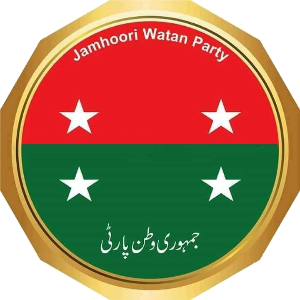
The Jamhoori Wattan Party is a political party in Balochistan, Pakistan.
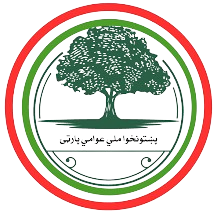
The Pashtunkhwa Milli Awami Party, abbreviated as PMAP or PKMAP, is a political party in Pakistan's Balochistan province. It was founded by Mahmood Khan Achakzai, who was elected as the chairman, and Sher Ali Bacha, who served as the General Secretary, in March 1989 in Quetta.

Mahmud Khan Achakzai is a Pakistani Pashtun regionalist politician who is the Chairman of Pashtunkhwa Milli Awami Party. Achakzai completed his Engineering degree from the Peshawar University of Engineering and Technology. In 7th National Congress of Pashtunkhwa Milli Awami Party on 19, 20 December 2022 Mahmood khan Achakzai re elected as the Chairman Of PkMAP. He is serving as member of National Assembly of Pakistan since 29 February 2024.
Muhammad Aslam Khan Raisani is a four times elected member of the Provincial Assembly of Balochistan who served as the Chief Minister of Balochistan from 9 April 2008 until 14 January 2013.
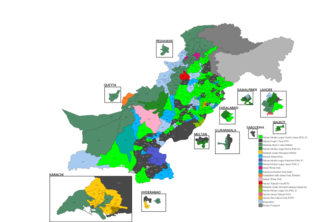
General elections were held in Pakistan on 10 October 2002 to elect the 12th National Assembly and four Provincial Assemblies. The elections were held under the military government of Pervez Musharraf. The two mainstream parties, Pakistan Peoples Party (PPP) and Pakistan Muslim League (N) (PML-N) had several restrictions imposed on them and their leaders Benazir Bhutto and Nawaz Sharif were in exile. In order to address the restrictions, PPP created the Pakistan Peoples Party Parliamentarians (PPPP) under the leadership of Ameen Faheem, to contest the elections on its behalf. The PML-N meanwhile, suffering from the party's division into two factions: one that remained loyal to Sharif and were contesting the elections under the leadership of Javed Hashmi, and the other which had broken away to form the pro-Musharraf Pakistan Muslim League (Q) (PML-Q) under the leadership of Mian Muhammad Azhar. The emergence of the PML-Q marked the beginning of multi-party politics in the country, bringing an end to the decade-long two-party system between the PPP and PML-N.

The National Party is a social-democratic, centre-left political party in Pakistan. It is one of the largest parties active in the province of Balochistan, Pakistan, along with the Balochistan National Party. It traces its legacy from the Kalat State National Party of Mir Ghaus Bakhsh Bizenjo, Mir Gul Khan Nasir and Mir Abdul Aziz Kurd, and is currently headed by Abdul Malik Baloch.

Nawab Zulfiqar Ali Magsi was the 19th Governor of Balochistan since 28 February 2008 to 9 June 2013 as well as the Chief Executive of Balochistan since 14 January 2013. Magsi also served as Chief Minister of Balochistan in the Benazir Bhutto government of 1993–1996. He is the current Nawab and Tumandar of the Magsi Tribe.
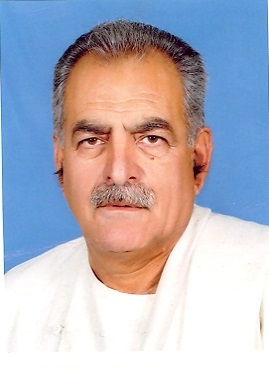
Dr. Hamid Khan Achakzai is a Pakistani politician and doctor from Balochistan affiliated with the Pakhtunkhwa Milli Awami Party.

Senate elections were held in Pakistan on 5 March 2015 to elect the replacements for 52 retiring senators. Those retiring include chairman Nayyar Hussain Bukhari and deputy chairman Sabir Ali Baloch of the upper house. Pakistan Peoples Party (PPP), the majority party in Senate, would lose 21 members, followed by Pakistan Muslim League Nawaz would lose 9 and Awami National Party would lose 6 members.

Mir Abdul Quddus Bizenjo is a Pakistani politician who served as the Chief Minister of Balochistan province of Pakistan from 29 October 2021 till 18 August 2023. He was a member of the Provincial Assembly of Balochistan. He was the former Party President of the Balochistan Awami Party.
Nasrullah Khan Zayrai, or Nasrullah Khan Bareach, is a Pashtun politician who is elected twice as a Member of the Provincial Assembly of Balochistan, from August 2018 to August 2023 and from May 2013 to May 2018. He remained in student politics and was one of the founding member of the Pashtoonkhwa Students Organization.
Sheikh Jaffar Khan Mandokhail is a Pakistani politician who is currently serving as the 24th Governor of Balochistan, in office since 6 May 2024.
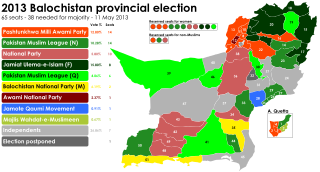
Provincial elections were held in the Pakistani province of Balochistan on 11 May 2013, alongside nationwide general elections and three other provincial elections in Sindh, Khyber Pakhtunkhwa and Punjab. The remaining two territories of Pakistan, Azad Kashmir and Gilgit-Baltistan, were ineligible to vote due to their disputed status.
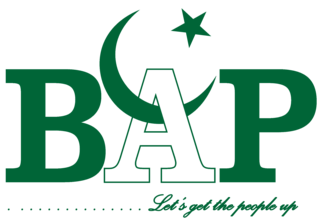
The Balochistan Awami Party is a political party based in the Balochistan province of Pakistan founded in 2018 by political dissidents of the Pakistan Muslim League (N) and the Pakistan Muslim League (Q) in Balochistan.

Provincial elections were held in the Pakistani province of Balochistan on 25 July 2018. Newly formed Balochistan Awami Party (BAP) emerged as the largest party by winning 24 seats followed by Muttahida Majlis-e-Amal who won 10 seats. Pakistan Tehreek-e-Insaf won 7 seats for the very first time.

Elections for the Senate of Pakistan were held on 2 April 2024. Senate elections in Khyber Pakhtunkhwa were postponed by the ECP.

Provincial elections were held in the North-West Frontier Province to elect the members of the 9th Provincial Assembly of North-West Frontier Province on 18 February 2008, alongside nationwide general elections and three other provincial elections in Sindh, Balochistan, and Punjab. The remaining two territories of Pakistan, AJK and Gilgit-Baltistan, were ineligible to vote due to their disputed status. These were the last elections held under the provincial name "North-West Frontier Province", later changed to Khyber Pakhtunkhwa following the Eighteenth Amendment to the Constitution of Pakistan.

Provincial elections were held in Balochistan on 8 February 2024 to elect a new provincial legislature. On 5 August 2023, after the approval of the results of the 2023 digital census by the Council of Common Interests headed by Prime Minister Shehbaz Sharif, elections have been delayed for several months, as new delimitations will be published on 14 December 2023. On 2 November 2023, the Election Commission of Pakistan announced, in agreement with the President of Pakistan, Arif Alvi, that the elections will be held on 8 February 2024. This election will be held concurrently with nationwide general elections and other provincial elections.

Indirect Presidential elections were held in Pakistan on 9 March 2024 to select the 14th President of Pakistan, who is the country's head of state. Asif Ali Zardari of the PPP was elected as President, defeating Mahmood Khan Achakzai of the PTI-backed alliance Outgoing President Arif Alvi was eligible for re-election but did not contest for a second term.





















